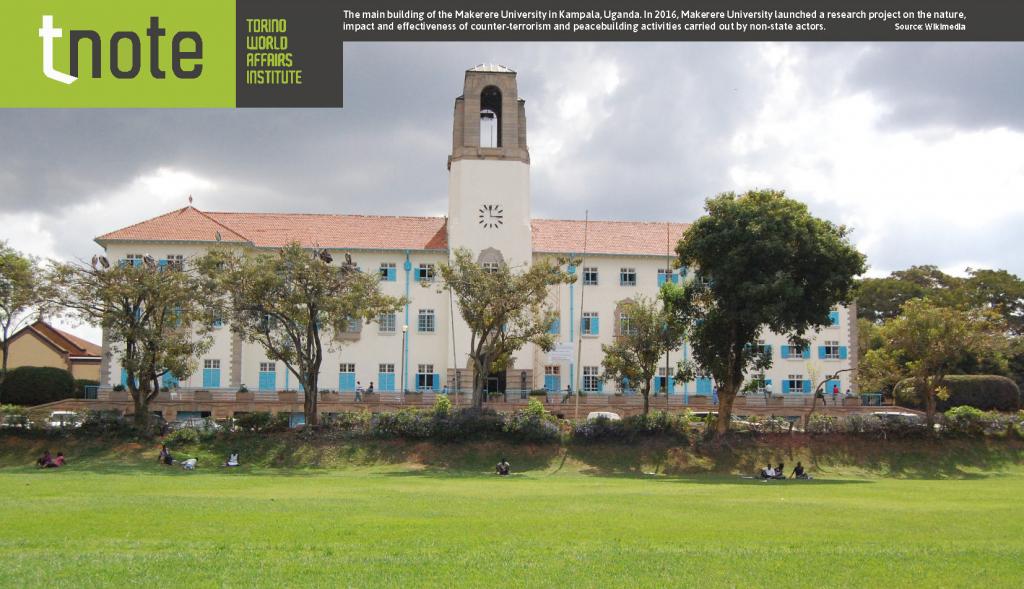
Sunday 11 July 2010 is indelibly written on the psyche of many Ugandans. On that day, the East African country experienced the well-known twin terrorist attacks in Kampala that led to more than 70 people being killed and many seriously wounded. Football lovers in the Ugandan capital were watching the 2010 FIFA World Cup Final when deadly explosions occurred at the Kyadondo Rugby Club and in a popular Ethiopian restaurant in the Kabalagala neighbourhood, a high-class suburb of Kampala. Al-Shabaab, a Sunni Islamist militia based in Somalia with ties to al-Qaeda, claimed responsibility for the blasts as retaliation for Uganda’s support of the African Union Mission in Somalia (AMISOM, 2007–present). The 2010 attacks were at the time the worst in East Africa since the 1998 US embassy bombings in Kenya and Tanzania. It was also the first time Al-Shabaab had struck beyond Somali borders. The bombings drew worldwide condemnation, and in May 2016 the Uganda High Court sentenced eight people convicted of terrorism, murder and attempted murder.
Overall, measures to counter extreme violence are often assumed to be effective when in fact more research and analysis is required to better understand their actual effectiveness and impact. Most studies on African responses to terrorism focus solely on state-led interventions, with little attention being paid to non-state agency. Acknowledging this gap, in 2016, Makerere University launched a research project funded by the United States Institute for Peace on the nature, impact and effectiveness of counter-terrorism and peacebuilding activities carried out by non-state actors, particularly CSOs.
The theoretical framework used in the research is a combination of conventional conflict transformation and post structural counter-terrorism. Various models have been developed in the domains of post-conflict peacebuilding and violence prevention, including i) the statist peacebuilding model, ii) the libertarian peacebuilding model, iii) the hybrid liberal peacebuilding model, iv) the transformative peacebuilding model, and v) the traditional African model. The state-centred model holds that, to achieve prevailing peace, the state has to be the central agent in the process. It holds that all measures should be oriented around the state; peacebuilders should respect state sovereignty or boundaries and follow state structures. The libertarian peacebuilding model argues that, for peace to return after a conflict, the liberal values of democracy and market-oriented economics should be instituted. The hybrid liberal model is mainly a reworking of the traditional liberal model, but one that emphasizes the reconstructive approach and the dismantling of war economies and one in which the process is locally grounded. The transformative model focuses on the overall transformation of society as the means of realizing peace. It addresses the structural causes of violence and seeks to achieve deeper social transformation. From a poststructuralist perspective, non-traditional actors (such as civil society organizations, CSOs) wield great influence in conflict management and has therefore been the main focus of the research being conducted by the University of Makerere.
Accordingly, the study was done on six purposively sampled CSOs: the Inter-Religious Council of Uganda (IRCU); the Muslim Centre for Justice and Law (MCJL); International Alert (IA); the Acholi Religious Leaders Peace Initiative (ARLPI); Action for Fundamental Change and Development (AFFCAD); and the United Religions Initiative (URI) Great Lakes. The key informants included CSO programme designers and implementers as well as beneficiaries.
Designed as a mixed-methodology study, the research employed both quantitative and qualitative methods of research: quantitative approaches were used to make sense of the statistical data that were to be collected from the various participants, and from data sets released by selected CSOs involved in responding to terrorism in Uganda. The qualitative research used interviews, focus group discussions and participatory observation, as well as document and content analysis intended to investigate how people ascribe meaning to the social world and their experience within it. Data gathered during the research divided the responses to terrorism into two major categories: state interventions/responses and non-state actor responses. In the former category the investigation found responses such as a) armed (military and police) intervention (internal and external); b) legislative intervention; and c) judicial responses. Among the non-state actors’ responses the investigation found a) international advocacy; b) accountability campaigns; and c) freedom activism.
Among its major findings, the research pointed out that a dual and dynamic response to terrorism exists, affecting the agency of both state and non-state actors. The research also unearthed a theoretically inverse relationship between the responses to terrorism of state actors and non-state actors. The complex variables and the dynamics surrounding anti-terrorism responses in Uganda reveal that even though the majority of CSOs initially reacted by actively or tacitly supporting the state’s interventions, over time most of the state actors’ interventions elicited inverse reactions. This dynamic relationship is one of the key insights that the research was able to bring forth and it has considerable implications for both state-led policy interventions and CSO responses to terrorism on the African continent, which require further investigation: Who exactly is mandated to fight terrorism? What capacities do they have? At what stage should they be involved?
—
Download

Copyright © 2024. Torino World Affairs Institute All rights reserved
